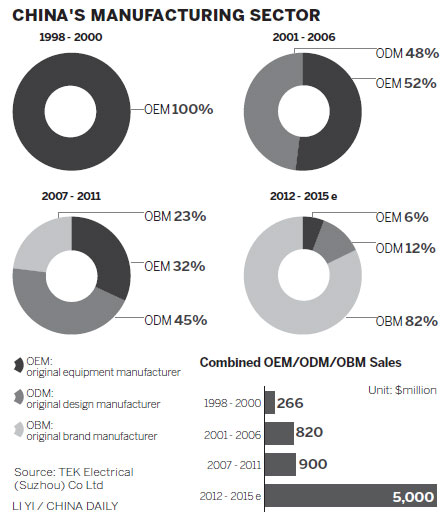Hard times call for innovative entrepreneurship
Updated: 2012-06-12 09:40
By Zheng Yangpeng (China Daily)
|
|||||||||||
Victory Precision is, in fact, a designated qualified supplier for nine out of the top 10 global TV brands.
Or, you can say Victory Precision's "brand" is the way it does business: It has changed the traditional definition of OEM by taking part in the R&D process of its clients. Its practice is a brand-new type of OEM.
Victory Precision, a privately owned company, was founded in 2003. But almost as soon as it started, it learned that the days for its business model, called processing with supplied designs, were numbered.
As the general price level for consumer electronics would go down by an average 15 percent each year, its manufacturers, unless they can manage to keep on cutting costs at a corresponding speed, faced grim prospects.
Fearing it would get stuck with a business with no future, Victory Precision decided to opt for its only method of survival, said Cao Haifeng, its president. And that was to give a better show to its specialized competitive edge by working with its clients from their R&D stage.
Out of its 45,000-strong payroll, the company has around 130-odd R&D employees. They are divided into three teams, with the first team specializing in helping clients to improve their own designs of the frame.
The other two teams focus on developing their own ideas and recommend them to clients, ranging from solutions that will save components and reduce costs, to designs that will prove more appealing to customers.
Cao boasted that compared to some of the clients' original designs, Victory Precision's ideas would help them earn up to 20 percent more in profit.
Such solutions and designs have, in due course, helped the company rake in more production orders. Cao was proud that his company can outdo its rivals simply because of its better R&D.
"We have a team of 35 specialists promoting new ideas. They come up with five to 10 new ideas every three months. Generally, one out of every five of our new ideas will sell to our clients," Cao said. "
Despite the global recession, the company has been able to keep its annual sales growing by around 10 percent.
But Cao admitted that making the LCD frame is still a low value-added operation. And its profit has been squeezed by rising labor, materials and transportation costs.
The company has already built a processing plant in Poland "to save logistics costs", said Cao, adding that it provides 80 percent of Philips' annual procurement of frames.
Besides, Polish workers are "slightly more productive" than Chinese workers but receive the same wage as the latter, Cao said.
zhengyangpeng@chinadaily.com.cn

Related Stories
US manufacturer Gore plans further Shenzhen investment 2012-06-06 07:10
Index points to softness beyond manufacturing 2012-06-04 11:23
China to expand high-end equipment manufacturing sector 2012-05-07 17:05
UK manufacturing declines as world counts on Chinese growth 2012-05-02 13:45
China manufacturing expands in April 2012-05-01 14:11
China's manufacturing picks up momentum in April: HSBC 2012-04-23 14:56
Today's Top News
President Xi confident in recovery from quake
H7N9 update: 104 cases, 21 deaths
Telecom workers restore links
Coal mine blast kills 18 in Jilin
Intl scholarship puts China on the map
More bird flu patients discharged
Gold loses sheen, but still a safe bet
US 'turns blind eye to human rights'
Hot Topics
Lunar probe , China growth forecasts, Emission rules get tougher, China seen through 'colored lens', International board,
Editor's Picks

|

|

|

|

|

|





